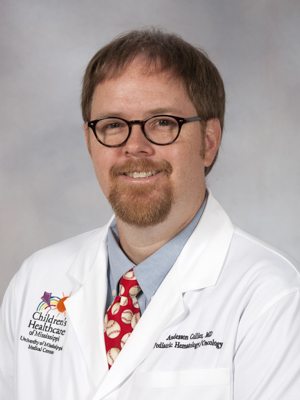Investigator Highlight: Dr. Anderson Collier

Dr. Anderson Collier, director of the Center for Cancer and Blood Disorders at Children’s of Mississippi, sees the results of research every day. Collier, also the D. Jeanette Pullen Chair of Pediatric Hematology-Oncology, helps treat Mississippi’s youngest cancer patients and also works daily on better treatments to offer patients.
How long have you worked with your current organization and what type of research do you do?
I have been at UMMC for nine years. Very broadly, I oversee all of the clinical trials at UMMC for childhood cancer. I currently oversee about 75 different research studies for which children with cancer are eligible. I also do research on Ewing sarcoma, a rare bone and soft tissue cancer that primarily affects adolescents and young adults. My last research focus is in the area of health disparities of childhood cancer in Mississippi.
Would you describe your most recent research and/or publications?
Through the Children’s Oncology Group (an international group that does research on childhood cancer), I am one of the principal investigators on an international study evaluating a new drug called Palbociclib for patients with relapsed Ewing sarcoma. This study is sponsored by the drug manufacturer Pfizer. I help to monitor the progress of the study, train investigators and will ultimately analyze the data for publication.
How does your recent research and/or publications relate to your overall research within cancer?
I became interested in bone tumors as a fellow in Dallas, Texas, so I have been involved in the treatment of children and adolescents with them my entire career. This interest has offered me the opportunity to do research with the Children’s Oncology Group related to outcomes and treatments of bone tumors for the majority of my career.
What advice can you give medical students and/or high-school students who are interested in pursuing a career in research?
One of my professional mentors conducted research in bone tumors, which is where my interest started. That relationship led to the opportunity to develop a concept for a multi-institutional trial for relapsed Ewing sarcoma. This concept has taken many iterations over several years with many starts and stops. Now, we have the current study.
Why did you choose pediatric cancer care and research?
As recently as 1960, a diagnosis of cancer in a child was essentially a death sentence. In the next 60 years, through continuous research in childhood cancer, the survival rate has gone from 10 percent to 80 percent today. While that improvement is a modern medical miracle, it also means that 20 percent of children will still die of cancer, making it the number one cause of disease-related death in children over 1 year old. And there are still some cancer types whose survival is less than 50 percent. I do pediatric cancer research to find new treatments and create new knowledge so that 80 percent will someday become 100 percent. This can only be done with people like me and my colleagues around the world who continue to push the boundaries of what we know to find those improvements and new treatments to improve that outcome.
What advice can you give medical students and/or high-school students who are interested in pursuing a career in research?
A former research mentor told me once that there is a reason it is called RE-search. Often times you have to do it again. So, my advice is to find an area, topic or subject about which you are passionate. And then keep at it. Research is not easy; it takes a lot of work; it takes even more perseverance. But creating new knowledge, discovering something that until you found it was not known is a reward that makes all the hard work worth it.


